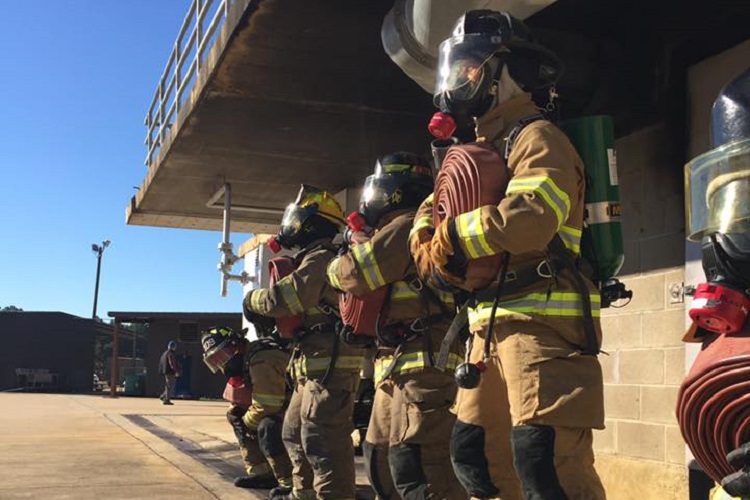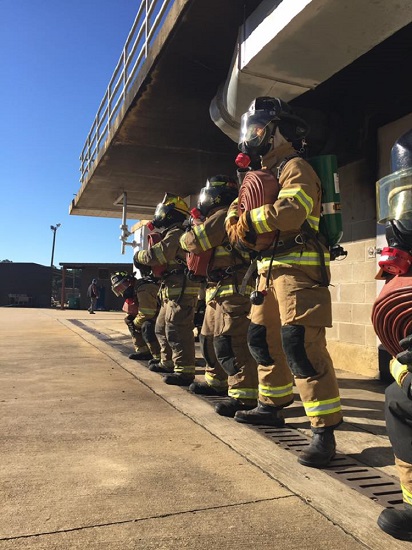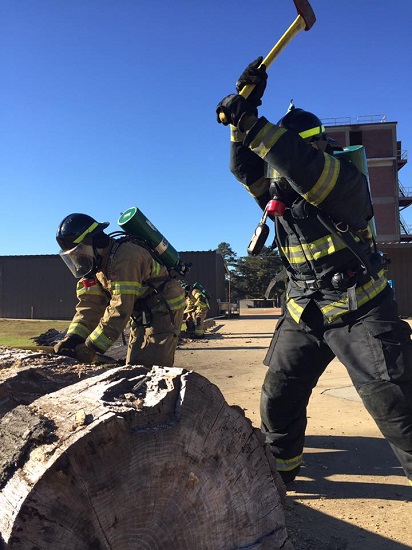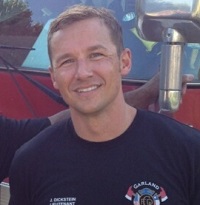

(1) The Mississippi State Fire Academy trains its students to work in full gear, from fire attack to cleanup. (Photos by Clarence Parks.)
By Justin C. Dickstein
The last time I was on an interview board for new hires, we asked all the candidates, “How many firefighters were lost on 9/11?” It was an experiment with a small sample size, but guess how many of them got the answer right? Zero!
As members who have been around the fire service for some time, the number “343” will always be in our memory. However, it conjures up certain things that we as veteran firefighters know and assume that everyone else does too.
When we wrote our book The Station-Ready Rookie, we wanted to give new firefighters a head start on some of the knowledge that was passed on to us throughout our careers. But what about some of the larger issues and discussions looming over the fire service? Stress-induced cardiac arrest, line-of-duty deaths, suicide and behavioral health, and cancer are all tough issues that are challenging to address with current firefighters, but what is our responsibility as officers and senior station members and mentors to pass on to new recruits?
The beginning of a probationary firefighters’ career is where he will develop habits that will send him down a path that will last the next 30 years or more. It is critical that we not only address these issues head-on but also set the example. Following is some of the advice from our book to put into context things that we can do to help our rookies with these significant issues.
“At the Station”
This chapter on cooking addresses the importance of knowing how to cook. However, it is also vital to emphasize the importance of proper nutrition and not just eating well but also eating healthy.
It is hard to overstate the impact that food served at the fire station has on both cardiac issues and cancer. Studies have shown that approximately 75 percent of all firefighters are overweight, with up to 40 percent being classified as obese.1 The solution to this problem starts in the kitchen. The link between poor diet, obesity, and cardiovascular disease has been well documented. But how many of us know the links between being overweight and developing cancer?
According to the American Cancer Society, although the links are not yet fully understood, excess body weight may contribute to as many as one in five of all cancer-related deaths in the general public.2 We are finally starting to realize that the smoke we have been breathing during overhaul and the soot we leave on our gear is killing us. However, are we adding yet another risk factor in the kitchen? If your rookie comes in not knowing how to cook, will you teach him to cook chicken-fried steak with gravy or chicken breast with plenty of veggies? Think about the impact that this choice will have on everyone at the firehouse.
“On Scene”
In this section, we stress wearing a self-contained breathing apparatus (SCBA) all the way through overhaul. This concept is starting to gain wider acceptance. We now know how harmful off gassing and postincident residual smoke are. We also probably know fellow members who became stricken with the types of cancer that arise from these residual exposures.
So, why do we not yet have 100-percent compliance? Because working in full gear and an SCBA is hard, period. It is tough work that requires very specific conditioning and adaptations. From the time when the alarm hits to when we have showered all the carcinogens off of our skin, we must be fit for the fire; this takes an active effort. Consistent, functional training and conditioning will not only allow a firefighter to work in SCBA for an entire fire, but it also might lower their risk for a stress-induced cardiac incident as well. If you or anyone on your crew (especially your rookie) is not able to work from the initial attack all the way through overhaul in his SCBA, then this is very loud signal of exactly what type of station-level training you need to be doing.
RELATED: Baker on Leading Throughout Probation and Beyond in the Fire Service ‖ Swanick on Training Probationary Firefighters ‖ Prziborowski on Setting Probationary Firefighters’ Expectations
“Attitude is Everything”
As we ask in our book, does your department—specifically your station—have a culture of health and wellness? Does your crew work out together, or at all? Exercise has been shown to have positive effects on all of the alarming issues mentioned throughout this article, including mental health.
Does your chief support dedicating time for fitness? The health and safety of department members should always be the highest priority. One of the best habits to instill in your rookie from year one on is annual physicals. This is key to detecting any underlying conditions as early as possible.
Imagine if you had those results and could compare and look at trends in your health over your entire career. A simple change of attitude about cancer-preventative tasks like decontaminating dirty bunker gear and regular hood washing can have an impact on the rest of someone’s life.

(2)
“Beyond the Job”
One of the most difficult discussions in the fire service today is firefighter suicide. It is easy to blame ignorance or tradition on not wearing an SCBA. It is easy to blame the station cook for derailing a new healthy diet with his signature biscuits and gravy. But who do we blame when a firefighter takes his own life? It is said that suicides occur when a person thinks that their problem exceeds their resources to deal with that problem.
One of the biggest barriers to getting help is the stigma that is attached to mental health issues. It is time to start making new hires aware that they might see and experience things that could affect their mental health. Don’t only make them aware but also point them in the direction of the resources readily available that can help them in times of need.
How many firefighters have you personally known that have dealt with these problems on their own? Start erasing the stigma on Day One so that your rookie will not feel ashamed or embarrassed to ask for help and deal with any issues the right way if he ever needs it. Talk about major incidents at the kitchen table, and know the plan for escalating interventions, if needed. Watch your crew, especially the new member.
The fire service is still trying to figure out all of these issuss. New research will continue to be presented and debated. It is our duty to pass along all this information—and more—on to our new firefighters the day they get the badge. There is no benefit to keeping them in the dark, expecting them to already have this knowledge, or to find it out for themselves. It is one thing to make them figure out how to clean the station on their own; it is quite another to not tell them about such significantly impactful topics. With open discussion, we can leave the fire service better than we found it while still being an active part of it.
References
- Durand G, Tsismenakis A, Jahnke S, et al. Firefighters’ physical activity: relation to fitness and cardiovascular disease risk. Medicine And Science In Sports And Exercise. 2011;43(9):1752-1759.
- https://www.cancer.org/cancer/cancer-causes/diet-physical-activity/body-weight-and-cancer-risk/effects.html.
 Justin C. Dickstein is a captain in the Garland (TX) Fire Department. He has been a frontline officer in responses to incidents as diverse as an ISIS-inspired terrorist attack and an EF4 tornado. He has B.A. and M.S. degrees from The University of Texas—Austin. He is a co-author of The Station-Ready Rookie (PennWell Books and Videos, 2015) and the creator of the BlastMask training regulator (BlastMask.com).
Justin C. Dickstein is a captain in the Garland (TX) Fire Department. He has been a frontline officer in responses to incidents as diverse as an ISIS-inspired terrorist attack and an EF4 tornado. He has B.A. and M.S. degrees from The University of Texas—Austin. He is a co-author of The Station-Ready Rookie (PennWell Books and Videos, 2015) and the creator of the BlastMask training regulator (BlastMask.com).

